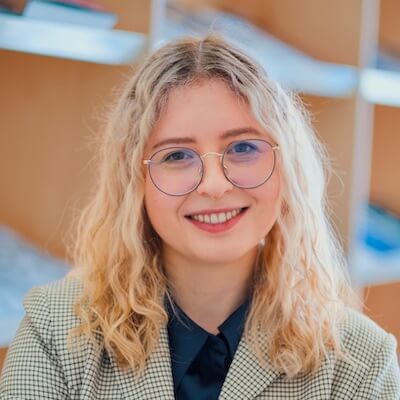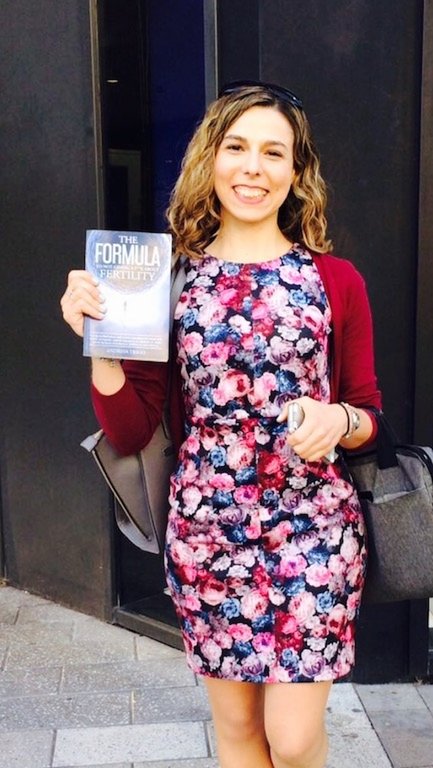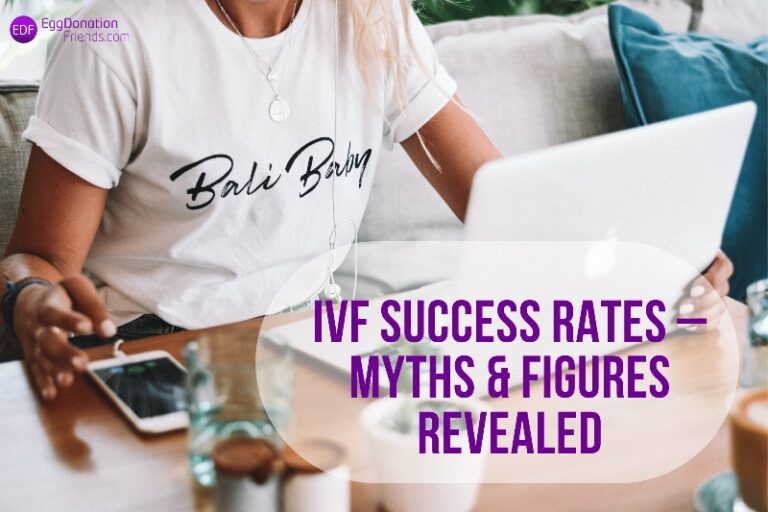Andreia Trigo is a registered nurse and NLP coach. She is a proud member of Fertility Nursing Forum at the Royal College of Nursing (UK) and also belongs to the RCOG* Specialists of Tomorrow Insight Group which aims to provide the highest quality care possible to patients. Andreia is a point of contact for Fertility Network UK. She has founded the inFertile Life which supports women and men in their IVF treatment journey.
EggDonationFriends had the pleasure to interview Andreia in London. We talked about her infertility story, the choices she has made in her life and, most of all, about support for infertile people who are currently undergoing IVF treatment with donor eggs, seek meaning of life, are suffering from emotional the roller-coaster, and those who are just embarking on this important, yet difficult, fertility journey.
EggDonationFriends: You were diagnosed with infertility at the age of 17. What was your initial reaction?
Andreia Trigo: When I was diagnosed, the initial reaction was shock, everything was a blur, I couldn’t make sense of what was happening and cried a lot. At 17 years of age, I hadn’t thought about having children but I didn’t like having the choice taken away from me. I guess we all take pregnancy for granted and think it will happen easily and when we want it to happen. And when we realise that is not the case, the whole world collapses. I was very young, I was still defining my values, my beliefs and my identity. I didn’t have the coping mechanisms necessary to make meaning of such a diagnosis. It was a very challenging time.
EDF: How did you manage to create perspective and find your own meaning of life?
AT: It has been a long journey of creating perspective and finding my own meaning of life. In the beginning, I didn’t know how to cope. It was like all the roles I had played in life up until then (as a daughter, sister, student, being athletic and interested in a healthy lifestyle) stopped existing, and the only role that mattered to me was the one of being a parent. That took over my life and became my only concern. I asked “Why me?” several times. My dad always said, “It’s not up to us to ask why, one day we will understand, because everything happens for a reason”. And he said it so many times that I started believing it.
I also started reading about positive psychology and started applying some neurolinguistic programming and logotherapy techniques on myself. And maybe a year after the diagnosis I made the decision “If I overcome this, there is nothing in life that I won’t be able to accomplish”. And from that moment on, I started rebuilding myself back again, and started introducing other roles into my life, as a university student, as a sister and daughter, as a girlfriend, as a fertility awareness advocate, determined to make a difference in the world. This was a slow journey, it took years until I felt 100% comfortable in my own body, mind and soul.
The pivotal moment that showed me the meaning of my life happened when I was around 32 years old, when I found myself at peace with infertility, with the certainty that there is always a plan B when we want to experience motherhood, and open to whatever the universe has to offer in the future.
EDF: When did you decide that you want to become a nurse and, later on, a coach?
AT: I always wanted to work in healthcare since I remember. I had this desire to help others in a time they are most vulnerable. I started my nursing degree when I was 18 years old and graduated when I was 22. I worked in surgery, anaesthesia, pain, research and managing different projects.
On the side, I had made a decision of helping other people facing infertility, I didn’t want them to feel they were alone. So I created a support group at the hospital and was writing a journal as well. But it was only two years ago that I felt I had more to offer. I realized I had managed to deal with being infertile rather well, had managed to look at my life from a perspective and find new meaning, and wanted to offer that to others. That’s when I decided to take my Neuro-linguistic Programming Coach diploma and create inFertile Life.
EDF: Do you only help people deal with involuntary childlessness? Do you also assist people who are undergoing IVF treatment, IVF with donor eggs/donor sperm or the ones who use a surrogate?
AT: Everyone has a different fertility journey and everyone will feel that journey differently. So the people I help are going through all sorts of experiences. Some have just been diagnosed and are trying to make meaning of what’s happening. Others are going through natural conception or IVF treatment with PCOS, IVF with own eggs/sperm or with donor eggs/sperm, others are going through surrogacy, others through adoption. Others are just trying to get on with life without children. The journey is never the same, but it’s about discovering what matters to you, what options you have and how we can help you get there.
EDF: What kind of help can people expect when they turn to your organization?
AT: At inFertileLife we support people at all stages of their journey. The focus is on assisting you in creating perspective and finding meaning in life, with a unique fertility path that suits you. We use a unique approach, combining clinical knowledge, coaching, logotherapy and NLP combined holistically. It’s a personalized partnership, custom-made to your goals. These might be regaining balance in your body, mind and soul, improving your psychological and physical health, eating habits, setting goals, dealing with stress, amongst others.
AT: Success means different things to different people. I have clients who found success in an alternative plan they hadn’t thought of before. Others found success after miscarriages when they were able to return to normal daily living, working and doing activities that are meaningful to them. Others found success when they were able to improve their health, go through all IVF treatment steps and get pregnant. Success will be defined by the specific goals that are important to each person.
EDF: Can you recommend any books for women struggling with infertility?
AT: There are a lot of books available. I would advise you get a book that helps you move forward in your journey. A book that helped me a lot in the beginning of my journey was “Secrets about Life Every Woman Should Know” by Barbara De Angelis. It’s not specific about fertility but helps with creating a different view of the world.
A good book for people going through miscarriages is “Coping with Infertility, Miscarriage and Neonatal Loss” by Amy Wenzel. It gives practical tools to move forward. My first book in this matter “The Formula to Not Giving a F**K about Fertility” is a good book to help women find their balance and boost their chances of success with conceiving naturally, with the help of IVF treatment or even adoption. This book is also helpful when you need to mourn the loss of fertility and embrace your childlessness.
EDF: What would you like to say to women who are just starting their IVF journey and are in the process of selecting the right clinic?
AT: If you are in the beginning of your IVF journey, be prepared to whatever might happen and prepare your body, mind and soul to increase your chances of success from the beginning. The medical team can do a lot, but you can also do a lot, in regard to nutrition, physical activity, habits, and managing stress and other emotions. When choosing an IVF clinic, medical team or coach, don’t settle. You need to feel comfortable and that you trust their knowledge and skills and that they will be with you throughout the ups and downs until you reach your goal.
EDF: What would you say to women who have just experienced a failed IVF treatment or suffered loss of pregnancy?
AT: If you have failed an IVF treatment or suffered loss of pregnancy, don’t rush to the next treatment without mourning the loss you’ve just had. Allow yourself to feel your feelings, and when you’re ready to go back to meaningful activities at home, at work and with friends. Build yourself back again before planning what to do next. Search for help with a counsellor or coach if need be. And remember, there is always a plan B.
If you are starting your IVF cycle or your embryo transfer appointment is coming soon, check the webinar “Coping with the two-week wait” and live Q&A session with Andreia Trigo. In the presentation Andreia shares strategies you can use to deal with this difficult time. Sharing is caring!
*Royal College of Obstetricians and Gynaecologists
RELATED READING
Deciding Between IVF and Adoption
Table of Contents
- 1 EggDonationFriends: You were diagnosed with infertility at the age of 17. What was your initial reaction?
- 2 EDF: How did you manage to create perspective and find your own meaning of life?
- 3 EDF: When did you decide that you want to become a nurse and, later on, a coach?
- 4 EDF: Do you only help people deal with involuntary childlessness? Do you also assist people who are undergoing IVF treatment, IVF with donor eggs/donor sperm or the ones who use a surrogate?
- 5 EDF: What kind of help can people expect when they turn to your organization?
- 6 EDF: Are you in touch with any of the people you have helped before or who have had successful IVF treatment? Any success stories you may share with us?
- 7 EDF: Can you recommend any books for women struggling with infertility?
- 8 EDF: What would you like to say to women who are just starting their IVF journey and are in the process of selecting the right clinic?
- 9 EDF: What would you say to women who have just experienced a failed IVF treatment or suffered loss of pregnancy?






